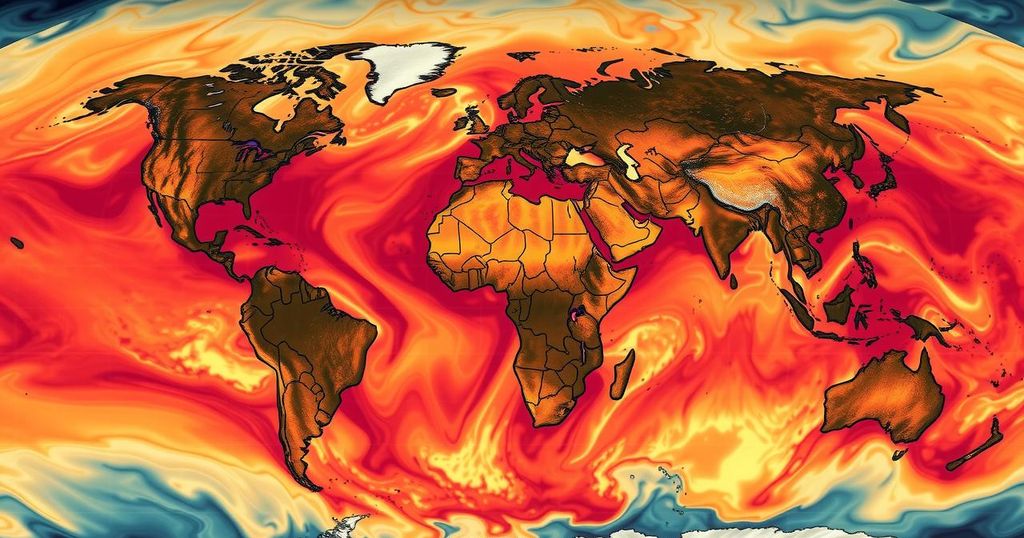Weather
AFRICA, ARCTIC, ASIA, CLIMATE, COPERNICUS, COPERNICUS CLIMATE CHANGE SERVICE, EUROPE, EXTREME WEATHER, FORECAST, GLOBAL WARMING, GREENHOUSE GAS EMISSIONS, NASA, NATIONAL CENTERS FOR ENVIRONMENTAL INFORMATION, NCEI, NOAA, NORTH AMERICA, OCEANIA, SERVICE, SOUTH AMERICA, UK MET OFFICE, WEATHER
Sofia Rodriguez
0 Comments
Climate Report for 2024: Record Warmth and Declining Antarctic Sea Ice
In 2024, global temperatures reached the highest recorded levels, exceeding previous highs by 0.18 degrees Fahrenheit. Antarctic sea ice levels hit their second-lowest extent, with significant climatic implications observed. Records from NOAA and other organizations confirmed these alarming trends, emphasizing the urgent need for climate action as upper ocean heat content also reached unprecedented levels.
According to an analysis conducted by the National Oceanic and Atmospheric Administration’s (NOAA) National Centers for Environmental Information (NCEI), the year 2024 has been officially declared the warmest year on record for our planet. This record-breaking heat coincides with a significant reduction in Antarctic sea ice, which has fallen to its second lowest extent ever recorded. In 2024, the average surface temperature of the Earth was 2.32 degrees Fahrenheit (1.29 degrees Celsius) above the 20th-century average, surpassing 2023’s record by 0.18 degrees Fahrenheit (0.10 degrees Celsius).
Regionally, continents such as Africa, Europe, North America, Oceania, and South America experienced their warmest years on record, while Asia and the Arctic observed their second-warmest years. Notably, all ten of the hottest years since 1850 have occurred within the last decade, and in 2024, the global temperature exceeded pre-industrial averages by 2.63 degrees Fahrenheit (1.46 degrees Celsius). Major scientific organizations including NASA and the Copernicus Climate Change Service corroborate NOAA’s findings, affirming the record temperature.
In terms of climatic indicators, Antarctic sea ice coverage averaged 4.00 million square miles—marking the second lowest extent recorded. Specifically, the sea ice extent reached a maximum of 6.59 million square miles in September, also the second lowest. Contrarily, Arctic sea ice averaged 4.03 million square miles in 2024, ranking as the seventh lowest. Conversely, the upper ocean heat content hit an all-time high, underscoring the ocean’s role in absorbing the majority of excess heat from climate change.
Cyclone activity for the year was near the historical average, with 85 named storms leading to 42 reaching tropical cyclone strength and 23 achieving major cyclone status. Among these storms, four attained Category 5 on the Saffir-Simpson scale, while overall cyclone energy was about 21% below the 1991-2020 average.
The increasing global temperatures and diminishing sea ice coverage are indicative of longstanding patterns of climate change driven by anthropogenic factors. Data spanning several decades indicates that Earth is experiencing unprecedented warming, which has direct repercussions for ecosystems and weather patterns worldwide. Various climate reports and scientific studies consistently reveal rising temperatures, providing compelling evidence that action is urgently needed to mitigate the impacts of climate change.
The year 2024 stands as a stark reminder of the ongoing climate crisis, with record-high temperatures and drastically reduced Antarctic sea ice serving as alarming indicators. The findings detailed in NOAA’s annual report indicate that decisive efforts are essential to combat climate change and preserve our planet’s future. The stark numerical evidence offers a sobering perspective on the importance of immediate and effective responses to climate challenges.
Original Source: www.noaa.gov




Post Comment